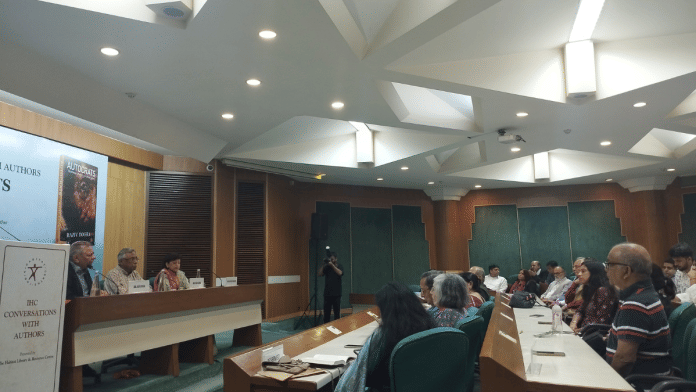New Delhi: Ambassadors and consul generals have a ringside view of all types of leaders, from despots to dictators. The Delhi launch of author and former diplomat Rajiv Dogra’s latest book, Autocrats: Charisma, Power and Their Lives, provided an opportune moment to explore the psyche of leaders—the autocratic kinds. The panellists at the recent discussion at India Habitat Centre rkept circling back to the ‘becoming’ of dictators.
“Is it a matter of distinct DNA? Childhood trauma? An inferiority complex like Hitler’s? Or are they just plain sadists who deserve to rot in hell?” asked Bhaswati Mukherjee, former diplomat and chairperson of IHC in discussion with Dogra and Pavan Varma, politician and former ambassador to Bhutan and Cyprus.
Dogra’s latest book explores how authoritarian regimes take hold, grow, and sustain themselves through the lives of leaders like Romania’s Nicolae Ceausescu, the USSR’s Joseph Stalin, current Russian President Vladimir Putin, and former chairman of the Chinese Communist Party Mao Zedong, among others.
“He talks about charisma. That’s very important because charisma can be dark and illuminated. When charisma is dark, it can bring about an autocracy,” said Mukherjee.
At one point in the discussion, Dogra who had also served as Indian ambassador to Romania, recounted meeting a prominent Romanian who was being tortured daily. Over time, the man became accustomed to the routine, reflecting how the human mind adjusts to such horrors. Mukherjee used this example to remind the audience that people can grow used to autocracy and dictatorship and hand over decision-making powers to others.
Also read: The humble picture postcard acted as a powerful colonial propaganda tool for the British
The new global order
Dogra not only analysed the causes behind this phenomenon of ‘strong men’ but also evaluated the methods pursued by autocrats, exploring their sense of infallibility and their behaviour.
Varma pointed out that the book shed light on the decline of these leaders, highlighting its importance in a context where many countries were witnessing the rise of strongmen. And like Mukherjee, he expressed concern that while questions about authoritarianism were being raised, proponents of democracy and the ‘liberal school’ had become complacent, inadvertently contributing to the unchecked rise of authoritarianism.
He also criticised the West for its hypocrisy and double standards—like supporting apartheid in South Africa for economic interests and ignoring the repressive regime that kept Nelson Mandela in prison for 27 years. At the same time, he acknowledged the importance of foreign intervention especially in connection with America’s and China’s roles in Pakistan — whether it will increase or decrease in the new global order.
Conquering the world is easy, governing it is far more difficult, said Dogra in response. He, too, was critical of America’s preference to deal with authoritarian leaders as it allowed easier manipulation to serve its self-interest. After all, Henry Kissinger said, “It may be dangerous to be America’s enemy, but to be America’s friend is fatal.”
America’s intervention has not been helpful at all for any country in the world, Dogra concluded.
Hunger doesn’t differentiate
Autocrats are often hailed for their discipline and strict example. Cyrus the Great, for instance—the founder of the Achaemenid Empire—built his kingdom through firm governance. But along with raising the living standards of his subjects, he also issued edicts granting people their rights. The Edict of Cyrus freed slaves and declared that all people had the right to choose their own religion. It is the first human rights charter that dates back to 500 BC.
“Hunger does not differentiate between democracy and dictatorship. The hunger differentiates between one chapatti and the other. We are lucky that we are one whole and we take pride in India,” said Dogra.
But Varma countered that when democracy is sustained, it becomes a habit.
No Delhi event is complete without shayari, and this time it was Varma who broke into verse—a Faiz Ahmed Faiz couplet—that Dogra had quoted in his book.
“Dil na umeed to nahin, nakaam hi to hai
Lambi hai gham ki shaam, magar shaam hi to hai.”
(The heart is not without hope; it’s just unsuccessful. The evening of sorrow is long, but it is still just an evening.)
He then asked Dogra why he remained pessimistic, especially considering that democracy has the potential to strengthen and learn from past experiences.
Dogra mentioned that he quoted two couplets in his book: one by Faiz, the Pakistani poet known for his pessimistic outlook, and the other by an Indian poet who expressed optimism.
“As far as India is concerned, I am very optimistic,” he said.
(Edited by Humra Laeeq)






